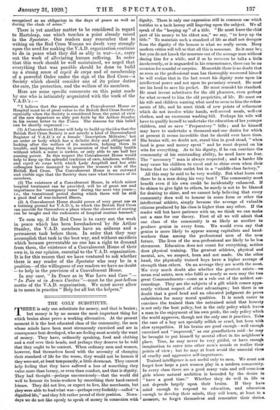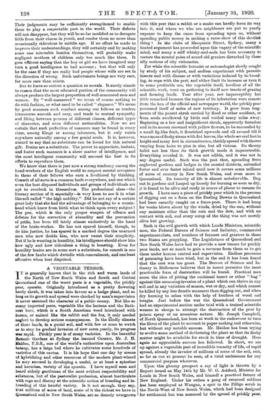1.1:11, ONLY SUBSTITUTE. T HERE is only one substitute for money,
and that is brains ; but money is by no means the most important thing for which brains alone prove a working alternative. At the present moment it is the best educated class of the community, the men whose minds have been most strenuously exercised and are in consequence best developed, who are feeling most acutely the want of money. They have, ordinarily speaking, food and clothing and a roof over their heads, and perhaps they deserve to be told that they ought to be content. When ordinary men and women, however, find themselves faced with the necessity of changing their standard of life for the worse, they would not be human if they were not, at least temporarily, a little downcast. They cannot help feeling that they have suffered a loss of something they value more than luxury, or even than comfort, and that is dignity. They had thought—perhaps unconsciously—that the world did well to Ronour its brain-workers by smoothing their bard-earned leisure. They did not live, or expect to live, like merchants, but theywere able to lead what was—perhaps very foolishly—called "a dignified life," and they felt rather proud of their position. Nowa- days we do not like openly to speak of money in connexion with dignity. There is only one expression still in common use which testifies to a tacit heresy still lingering upon the subject. We all speak of the "keeping up" of a title. "He must leave the chief part of his money to his eldest son," we say, "to keep up tin title." To maintain such a standard of life as shall not derogate from the dignity of the honour is what we really mean. Many modem critics will tell us that all this is nonsense. So it may be; but you do not knock the nonsense out of the average man without dazing him for a while, and if as he recovers he talks a little incoherently, or is unguarded in his remonstrance, there can be ne occasion for scandal or surprise. Meanwhile there is no doubt that as soon as the professional man has thoroughly recovered himseli he will realize that in the last resort his dignity rests upon his intellectual power and not upon its pecuniary reward. He must use his head to save his pocket. He must remodel his standard. He must invent substitutes for the old pleasures, even perhaps for what seemed to him the old proprieties, of life. Ho must see his wife and children wanting what used to seem to him the refine- ments of life, and he must think of new points of refinement which do not involve white hands, well-served meals, well-cut clothes, and an enormous washing-bill. Perhaps his wife will have to qualify herself to undertake the education of her younger children, and so save " Preparatory " bills ; and he himself may have to undertake a thousand-and-one duties for which at present it seems incredible that he should ever have time. His brains will, we doubt not, stand him in good stead, "when land is gone and money spent" and he must depend on his wits for everything. As to his dignity, if he can convince the community of his outstanding ability, he need have no fear. The " necessary " man is always respected ; and a harder life may cause his children to excel and to shine even when their brains find no visible outlet but in a "middle-class factory."
All this may be said to be very worldly. But what harm can there be in a man doing his very best The community must benefit even if his own credit be incidentally enhanced. If he shines to give light to others, he surely is not to be blamed for desiring to shine, and we cannot help believing that every community does well to honour in some form or other the intellectual athlete, simply because the average of valuable citizens produced by his class is higher than any other. If the reader will but have patience with us, we think we can make out a case for our theory. First of all we will admit that one class of the community is as likely as another to produce genius in every form. We would even say that genius is more likely to appear among capitalists and hand- workers than among the professional men of the near future. The lives of the non-professional are likely to be lesa strenuous. Education does not count for everything, neither does physical training. The greatest athletes, physical and mental, are, we suspect, born and not made. On the other hand, the physically trained boys have a higher average of strength than others. On an average they are worth the most. We very much doubt also whether the greatest saints—we mean real saints, men who fulfil as nearly as men may the two great Commandments—come as a rule out of the noblest sur- roundings. They are the subjects of a gift which comes appa- rently without respect of other advantages ; but there is no doubt that a good head and an educated judgment do prove substitutes for many moral qualities. It is much easier to convince the trained than the untrained mind that honesty is not only the beat policy, but is the only policy which leaves a man in the enjoyment of his own pride, the only policy which the world approves, though not the only one it practises. Take the case of a boy not specially selfish or cruel, but born with slow sympathies. If his brains are good enough—well enough exercised and "improved," as our grandfathers said—he may be brought to put himself by mental effort in his neighbour's place. True, he may never bo very pitiful, or have enough imagination to enter into other men's moods or realize their points of view ; but he may at least avoid the unsocial vices of cruelty and aggressive self-importance.
Trained intelligence is not useful only to men. We must not forget how large a part women play in a modern community. In every class there arc a good many vain and self -connious girls whose natural ambition is bounded by the desire to "have a good time." Whether they do well in life or not depends largely upon their brains. If they have mind enough to respond to education, and education enough to develop their minds, they will learn, at least in a measure, to forget themselves and remember their duties.
Their judgments may be sufficiently strengthened to enable them to play a respectable part in the world. Their defects will not disappear, but they will be so far modified as to derogate little from their charm in youth, and render them no more than occasionally ridiculous in middle age. If no effort be made to improve their understandings, they will certainly end by making some one miserable besides themselves, will probably make negligent mothers of children only too much like them. It goes wtthout saying that the boy or girl we have imagined may turn a good intelligenee to bad account ; but that will only be the case if they are really bad people whose wills are set in the direction of wrong. Such unfortunate beings are very rare, far more rare than saints.
But to leave so serious a question as morals. It surely stands to reason that the most educated portion of the community will always produce the largest proportion of well-mannered men and women. By " well-mannered " we mean of course nothing to do with fashion, or what used to be called "elegance." We mean by good manners such conduct among our fellows as renders intercourse smooth and easy, and tends to mutual sympathy and liking between persons of different classes, different types of character, and even different nationalities. Now we are certain that such perfection of manners may be found in every class, among Kings or among labourers, but it only exists anywhere naturally among a few genial souls. It is, however, absurd to say that no substitute can be found for this natural gift. Brains are a substitute. The power to appreciate, imitate, and foster such manners is a sheer matter of intelligence, and the most intelligent community will succeed the best in its efforts to reproduce them.
We know that there is just now a strong tendency among the hand-workers of the English world to suspect mental arrogance In those of their fellows who earn a livelihood by thinking. Conoeit of all sorts is a common fault everywhere, and one which even the best disposed individuals and groups of individuals are apt to overlook in themselves. The professional class—the literary section of it especially—is very keen to see it in what Disraeli called "the high nobility." Did he not say of a certain great lady that she had the advantage of belonging to a cousin- hood which knew from birth what to think upon every subject? The pen, which is the only proper weapon of offence and defence for the correction of absurdity and the prevention of pride, has been till lately almost exclusively in the hand of the brain-worker. He has not spared himself, though, to do him justice, he has spared in a marked degree the unarmed men who now deride him, who now vaunt their simplicity. But if he is wanting in humility, his intelligence should show him how ugly and how ridiculous a thing is boasting. Even for humility brains are in some sort a substitute, for conceit is one of the few faults which dwindle with concealment, and one least offensive when best disguised.



































 Previous page
Previous page